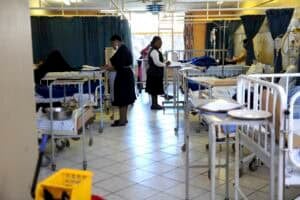The public sector wage strike saw grieving families unable to bury their loved ones.

Bodies have been piling up at government mortuaries and hospitals due to the public sector wage strike, with grieving families unable to bury their loved ones and get closure.
Undertakers have lamented the delay in autopsies and that getting documentation, such as authorisation to remove bodies as well as death certificates at the department of home affairs, have been a struggle due to the strike.
With no staff or staff on a go-slow as part of the National Education, Health and Allied Workers’ Union (Nehawu) strike, bereaved families have not been attended to in time, delaying funerals by up to a week.
Double blow for undertakers
Service providers were affected the most, particularly in Gauteng, KwaZulu-Natal and the Western Cape, where some of the home affairs offices were closed.
Walter Mbatha, Director of Kwelamathongo Funeral Services in KwaZulu-Natal, said the strike was particularly devastating to the industry as it came at a time when they were still grappling with the impact of load shedding.
ALSO READ: ‘Go back to work or face consequences’ – Phaahla warns Nehawu
He said because of the electricity crisis, families were forced to bury their loved ones in the short space of time to avoid bodies decomposing as the power surge when electricity is restored damaged cool rooms.
“Now we are dealing with the issue of being unable to collect bodies at government mortuaries and hospitals because of the strike. A death certificate cannot be issued until an autopsy to determine the cause of death has been conducted. This means the body will languish at the mortuary for longer,” Mbatha said.
Bereaved denied closure
He said this also meant bereaved family were unable to claim from their funeral policies for funds to prepare for the funeral, which delayed funerals and stalled the healing process.
According to the National Funeral Practitioners Association of SA (Nafupasa), though the backlog was gradually easing due to the return of some essential services staff at government mortuaries and hospitals, their members have been severely affected.
National spokesperson Dududu Maganu said bereaved families have been the hardest hit in terms of financial and emotional distress, having to go to government mortuaries, hospitals and department of home affairs several times before getting bodies released.
ALSO READ: Health worker protest: Death toll climbs as court interdicts strike
He said the first week of the strike was particularly tough as their members were unable to even enter government mortuaries and hospitals to collect bodies.
“When entrance was eased up, then the issue was getting paperwork done as there was no one to attend to undertakers,” Maganu said.
He explained how it was a struggle to get the notification of death form filled in by all required personnel like a doctor and home affairs official.
“They have had to wait for hours to get the paperwork signed because we are not allowed to go to the wards ourselves to pick up the notification of death forms. Then you have to do a death registration at home affairs, then you are met with either being unable to do the registration or home affairs is experiencing load shedding,” Maganu added.
Broader impact
Public servants affiliated with Nehawu were on strike countrywide since last week Monday, blocking entrances to public health facilities and preventing the public from getting medical attention.
The union demanded a 10% wage increase, while government offered 4.7%. The strike continued despite an interdict obtained by the Department of Public Service and Administration from the Labour Court after the (DPSA.
According to a preliminary report by the Department of Health, at least four people have died as a result of the strike action.
Department of Health spokesperson Foster Mohale said they were working with provincial health departments to establish the full picture with regards to the impact of the strike on essential health services.
He said this will touch on a number of factors including the cancelled elective surgeries, collected chronic medications and mortality during the strike as well as delayed autopsies.
“Our immediate task is to ensure that the situation is normalised and workers return to their work stations,” Mohale added.
NOW READ: Nehawu strike: Lives lost during volatile strike – Health Dept






